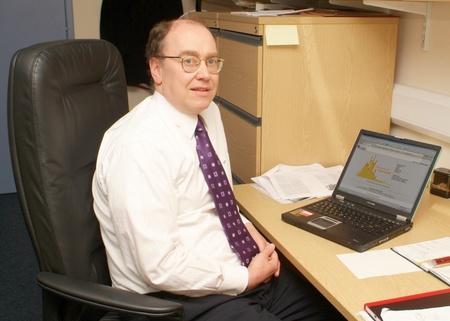The University of Aberdeen is part of a new UK research centre to tackle the impact of musculoskeletal disorders on people's ability to work.
Researchers at the £1.4million Arthritis Research UK/MRC Centre for Musculoskeletal Health and Work, led by the University of Southampton, aim to find cost-effective ways of reducing the impact of conditions that affect the muscles, joints and bones on people’s employment and productivity, with benefits for patients, employers and society as a whole.
According to the Office for National Statistics (ONS) almost 31 million days of work were lost last year due to back, neck and muscle problems, and they accounted for more prolonged absences than any other ailment. Musculoskeletal disorders have been the primary cause of absenteeism for the past five years, with the UK having one of the highest rates in Europe. However, more scientific evidence is needed on the best approaches to their management, and the interventions that could most effectively reduce their impact in the workplace. The new centre aims to fill that gap.
Professor Gary Macfarlane, Professor of Epidemiology, will lead the input from Aberdeen. Welcoming the announcement, Professor Macfarlane said: “Although research has improved our understanding of how to manage rheumatic and musculoskeletal disorders in order to improve quality of life for patients - it is less clear how we can most effectively allow patients to remain in work. The work at Aberdeen within this new centre will focus on Ankylosing Spondylitis and common musculoskeletal pain disorders (such as back pain) as well as looking to use new technology (the internet and social media) to deliver positive messages to improve work outcomes amongst patients."
The national centre will be co-located with the MRC Lifecourse Epidemiology Unit at the University of Southampton, with collaborating ‘spokes’ at the Universities of Aberdeen, Oxford, Lancaster, Liverpool, Manchester and Salford, Guy’s and St Thomas’s Trust and Imperial College.
Director of the new centre, Professor David Coggon, said: “Musculoskeletal conditions are a major cause of sickness absence and job loss. We’re enormously excited about our new centre which we hope will lead to new ways of preventing their occurrence, and helping employees who are affected to stay in productive work.”
Dr Stephen Simpson, director of research at medical research charity Arthritis Research UK said: “The reason for setting up the centre is that we simply don’t know enough about the best ways of keeping people musculoskeletal conditions in employment. Our researchers will be working with employees, employees and the medical profession to find solutions to what is a major issue for society, and we expect it will lead to some direct, practical outcomes.”
The national team already has an established research track record on the relationship between health and work, and now aims to place a greater emphasis on development of practical interventions – organisational, behavioural and physical – to reduce the impact of musculoskeletal conditions, whether or not they are caused by work. They will work closely with clinicians, employers, employees and patients to emphasise the importance of people with musculoskeletal conditions remaining at work where possible.
Overall the new centre is planning a number of specific research projects that could have important impacts on policy and on the management of musculoskeletal disorders in the workplace, including:
- Investigating whether a social media and internet campaign to spread positive messages about how best to manage back pain, can improve outcomes for patients
- Working with GPs and employers to improve the effectiveness of the new GP ‘fit note’ which has replaced the sick note.
- Developing guidelines for patients undergoing surgery for conditions such as knee osteoarthritis and carpal tunnel syndrome on when they should return to work, and what their subsequent levels of activity in the workplace should be.
- Finding out whether working to an older age is good or bad for health, and in what circumstances.
The Aberdeen team will focus on:
- Ankylosing Spondylitis. The management of this debilitating condition - which is characterised by stiffness of the spine - has been transformed by "biologic" therapies, and the team will investigate whether - in addition to reducing disease activity and improving patients’ quality of life - they have a positive impact on work. This involves data from the national register, co-ordinated from Aberdeen and involving 70 centres throughout Great Britain recruiting patients.
- Analysing data from a series of randomised controlled trials of musculoskeletal pain (such as low back pain, shoulder/neck pain) to determine which types of management have a positive impact on work e.g. increase patients' capacity for work and help them to keep in employment
- Investigating whether a social media and internet campaign to spread positive messages about how best to manage back pain, can improve outcomes for patients.


